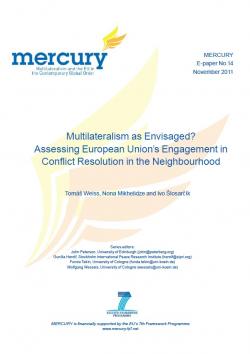Multilateralism as Envisaged? Assessing European Union’s Engagement in Conflict Resolution in the Neighbourhood
This paper focuses on the European Union’s practice in resolving conflicts in its neighbourhood. It analyses the extent to which the EU lives up to its declarations and proceeds multilaterally, in cooperation with other international actors. Two case studies are presented - on Georgia and Bosnia and Herzegovina - in which concrete EU behaviour on the ground is studied. The paper argues that various types of engagement are used by the EU in the conflicts: inaction, uni-, bi-, and multilateralism. Whereas bilateralism seems to be circumstantial, unilateralism and multilateralism belong to EU’s preferential modes of activity. At the same time, the EU is much more effective in supporting multilateral activities than in leading them.
Paper prepared within the framework of Mercury, a project funded by the Seventh Framework Programme of the European Union. Published in: Caroline Bouchard, John Peterson and Nathalie Tocci (eds.), Multilateralism in the 21st Century. Europe's Quest for Effectiveness, London and New York, Routledge, August 2013, p. 157-177, ISBN 978-0-415-52003-4; 978-0-415-52004-1 (pbk).
-
Details
Edinburgh, MICROCON - University of Edinburgh, November 2011, 32 p. (MERCURY E-paper ; 14)
Introduction
Multilateralism in Conflict Resolution
European Union’s Approach to Conflict Resolution
EU and Georgia’s Territorial Conflicts: Effective Non-Multilateralism
The Actors Involved
The EU and the Peace Process: a Bilateral Actor at the Margins of Multilateralism
EU’s Marginal Multilateralism?
Factors Impeding Multilateralism
The EU and the Crisis in BiH: From Successful Multilateralism to Failing Unilateralism
The Actors Involved
The EU in Bosnia and Herzegovina
The EU’s Multilateralism
The EU’s Bilateralism
The EU as a Unilateral Actor
The Mismatch of Tools and Aspirations
Conclusions
References
Topic
Tag
Related content
-
Ricerca06/01/2014
MERCURY – Multilateralism and the European Union in the contemporary global order
leggi tutto -
Publication31/05/2013
Multilateralism in the 21st Century
leggi tutto



